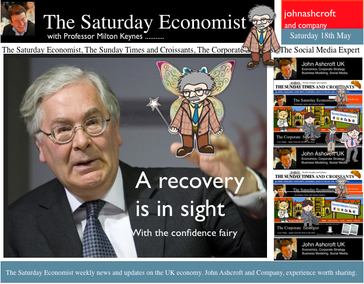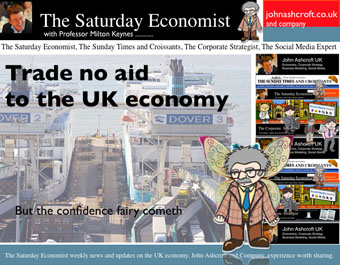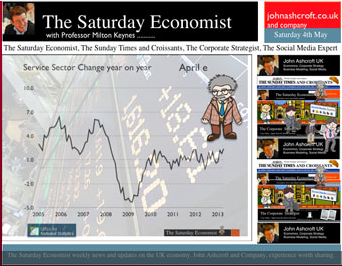 Economics news – I met with the Chancellor of the Exchequer this week! I met with the Chancellor of the Exchequer on Friday! Yep it has been a great week for the Saturday Economist. Breakfast with Sir Mervyn King, Tuesday, Thursday, the quarterly pro.manchester economics presentation and Friday a meeting with the Chancellor of the Exchequer, George Osborne. It was a brief encounter. The Chancellor was delivering the Annual Brian Redhead lecture at Media City. Thanks to Peter Salmon and the BBC team, I was a guest, one of few suits, in the audience of media peeps. Following his lecture, George Osborne was interviewed by Steph McGovern, largely about media and with little reference to economics. Afterwards I did get to meet the Chancellor and talk about the economy briefly. It has actually been a good week for the Chancellor. The second estimate of GDP confirmed growth in the economy at 0.6% in the first quarter. Inflation (CPI) fell in April to 2.4% from 2.8% in March, catching most analysts by surprise. Manufacturing prices both input and output fell back as a result of softening oil prices. The borrowing figures, were revised to record a slight fall in the financial year compared to previous year and the underlying figures for April suggest the deficit will fall as expected this year. The FTSE flirted with the 6,850 level before falling back in exhaustion to close the week at 6,654. The IMF pulled punches, no overt criticism of policy, suggesting just a modest tweak to the austerity plan with a £10 billion infrastructure spend to offset the austerity cuts to come. All good news. By the end of the year, the Chancellor may be running the most successful economy in Europe excluding Latvia, Lithuania and Luxembourg. What a transformation. Hang on a minute, can it really be so good? The unemployment figures last week were a little disappointing and the retail sales figures for April, with a rise of just 0.4% year on year were pretty dire. Real earnings are a drag on growth. It’s a fragile recovery, the IMF suggests we are a long way from a strong and sustainable recovery and the prospects for growth remain weak. We are slightly more upbeat and so for that matter is the Governor. Weak growth last year was undermined by slow output from the oil sector and weakness in construction, argues Sir Mervyn King. Prospects for service sector growth are pretty good this year, quod erat faciendum. In our quarterly economics forecast we still expect growth over 1% this year. There are 75 slides in the economics presentation, available on line as a free download from the NEW Saturday Economist web site. One hundred delegates signed up for the presentation this week and 1000 visited the site in only the second week online. Check out the New Saturday Economist web site, probably the best economics web site in the UK. What happened to sterling? Sterling slipped to 1.5123 from 1.5168 against the dollar and fell against the euro at 1.1691 from 1.1811. What is it about the Euro? The Euro dollar closed at 1.2932, against the pound it remains significantly over valued but may yet move higher. Oil Price Brent Crude closed at $102.64 from $104.64. In May last year the average prices was around $108 compared to almost $120 in April. Inflation will remain subdued but without the same dramatic falls last month. Markets, it was clip the suckers week. The Dow closed at 15,303 from 15,354 trading intra week over 15,500. The FTSE closed at 6,654 from 6,723, wiping out soft money over 6,850. Time to sell in May and go away we said last week. The easy calls have been made - market makers pocket loose change for the long week-end, using Bernanke's QE statement as the excuse, as they mug the punters! UK Ten year gilt yields held at 1.91 but US gilt yields closed up 2.01 from 1.95. As for gold, gold closed up at $1,392 from $1,361. Check out the gold price on The Saturday Economist web site. Confused? Check out The Saturday Economist web site, probably the best economics site in the UK. That’s all for this week, don’t miss The Sunday Times and Croissants out tomorrow. The Saturday Economist.com is mobile friendly, no need for a special app any more! Join the mailing list for The Saturday Economist or forward to a friend to let them share the fun! Don't forget to check out the new web site The Saturday Economist.com. John The material is based upon information which we consider to be reliable but we do not represent that it is accurate or complete and it should not be relied upon as such. We accept no liability for errors, or omissions of opinion or fact. In particular, no reliance should be placed on the comments on trends in financial markets. The receipt of this email should not be construed as the giving of investment advice. It's just for fun, what's not to like! Dr John Ashcroft is The Saturday Economist.
0 Comments
 Economics news – Inflation Report, a welcome change in outlook Inflation Report Wednesday, May Inflation Report, last in the series (of 82) for Sir Mervyn King as Governor. “There is a welcome change in the economic outlook". Projections are for growth to be a little stronger and inflation a little weaker than expected three months ago. "A recovery is in sight”. Excellent. The Governor is upbeat. The forecast is for growth - slightly above 1% for the year as a whole, with a gradual recovery thereafter. Base rates are likely to remain on hold until 2016, inflation will moderate from the current 2.8% level but is likely to remain above target by the end of the year. This all fits nicely with The Saturday Economist outlook outlined earlier in February this year! No black clouds, no stormy water, no difficult charts to navigate, the economy is headed for a safe harbour that even a Canadian novice could pilot apparently. The King has had his day, "now it is over to the next generation to have theirs", he added, before leaving the room with an obvious smile on his face. Concerns about Europe Well there are a still a few concerns about Europe! “The main downside risk to the recovery continues to stem from overseas, especially in the euro area”. So it proved with the Eurostat updates on the Euro economy mid week. Not doing quite so well, the flash estimate for the first quarter of 2013 suggested Euroland GDP fell by 1% compared to the first quarter of 2012. It is not looking too good, the pigs are breeding and heading north. The French economy slipped back into recession with a fall of 0.4% following a similar fall in the prior quarter. Even the Germans, took a knock, with output down by 0.3% in the first three months. NIESR predicts negative GDP out turn for the Euro in the year, which fits nicely with the IMF three speed world recovery outlined recently by Christine Lagarde. Hopefully the UK is moving away for European trends and joining the Anglo Saxon growth alliance, as the US recovery gathers pace. Employment UK Not quite so fast as hoped, perhaps, the employment stats released on Wednesday were a little disappointing. The claimant count continued to fall into April, down by 8,000 to 1.52 million and a rate of 4.5%. The number of vacancies also increased slightly but on the wider LFS count, the number in employment actually fell slightly in the three months to March. That’s the great thing about the employment stats, sixty pages with something therein for politicians of any hue. For two handed economists, the data is at times indecipherable, the earnings data, incomprehensible, flat at best. Confused? Check out The Saturday Economist web site, probably the best economics site in the UK. What happened to sterling? Once again, it’s all about the dollar, pushing to 103.1 from 101.5 against the yen and to 1.2838 (1.2992) against the Euro. Sterling also fell to 1.5168 from 1.5356, down slightly against the euro at 1.1811 from 1.1825. Oil Price Brent Crude closed at $104.64 from $103.91. No impact on inflation at this level. Markets, once again the beneficiaries of US hopes. The Dow closed at 15,354 from 15,118 and the FTSE closed at 6,723 from 6,625. Time to sell in May and go away perhaps our US readers cautioned otherwise last week. UK Ten year gilt yields held at 1.90 but US gilt yields closed up 1.95 from 1.90. As for gold, gold closed down at $1,361 from $1,447. That’s all for this week, don’t miss The Sunday Times and Croissants out tomorrow. The Saturday Economist.com is mobile friendly, no need for a special app any more! Join the mailing list for The Saturday Economist or forward to a friend to let them share the fun! Don't forget to check out the new web site The Saturday Economist.com. John The material is based upon information which we consider to be reliable but we do not represent that it is accurate or complete and it should not be relied upon as such. We accept no liability for errors, or omissions of opinion or fact. In particular, no reliance should be placed on the comments on trends in financial markets. The receipt of this email should not be construed as the giving of investment advice. It's just for fun, what's not to like! Dr John Ashcroft The Saturday Economist.  Economics news – rates on hold, manufacturing and trade figures disappoint, Economics news – Base rates Base rates were left on hold this week and QE spending was held at £375 billion. Real rates adjusted for inflation, are minus 2.3%. Factor in QE allegedly worth a further 4% in rate cuts and monetary policy cannot be more accommodating. Don’t place too much hope on a change in policy when the Canadian comes. Other than flying around in a helicopter, throwing out cash, along with a nominal GDP target, there is not much more the Canook can achieve. As for forward guidance, watch out for the progressive rise in bond yields in the months ahead. Manufacturing figures were released for March, not much in the data that had not already been factored into the GDP figures for the first quarter. The output index increased to 104.0 from a dismal 102.9 in February. Don’t get too excited, output in the month was down by 1.4% compared to prior year and 3% for the quarter as whole, slightly worse than first thought. The Prime Minister’s plan to re industrialize Britain must be scheduled for later in the year as the march of the makers, rebuilding the work shop of the world is on the back foot once again. Our forecast for the year is for a fall in manufacturing output over the year of around 0.5%, offset by growth in the service sector. We still see positive GDP growth of plus 1% for the year ahead.
Trade figures in March, suggest more of the same disappointment to the rebalancing agenda. Trade is no aid to the UK economy. The trade in goods deficit in March was £8.9 billion in March, offset by a surplus in services of £3.0 billion. For the quarter as a whole, the trade in goods deficit was £25.9 billion in line with our forecast for the year as a whole of around £106 billion. The service sector surplus in the quarter was £17.4 billion, slightly down on last year’s figure but no need as yet to adjust our forecast for the year of around £75 billion. The overall deficit easily financed and placing no great pressure on sterling. No surprises in the latest data set but a wake up call to misdirected policy hopes. What’s happening in the car market? Registrations in the first four months are up by almost 10%. We are increasing our forecast for the year to just under 2.2 million units. Despite growth in car manufacturing output, the trade deficit will continue to place pressure on the trade figures, the UK will import amost 2 million cars this year. For more information on this and more check out The NEW Saturday Economist.com web site or follow the professor @satdayeconomist. All the economics you would ever want to know! What happened to sterling? The dollar made the news this week, pushing to 101.5 against the yen and to 1.2992 against the Euro. Markets just love the Japanese monetary expansion. Sterling slipped as a result of dollar strength, falling to 1.5356 from 1.5563 against the dollar but unchanged against the euro, 1.1825 from 1.1863. Oil Price Brent Crude closed at $103.91 from $104.2. No impact on inflation at this level but no evidence of surging world trade either. Markets, were the beneficiaries of US hopes as the Dow closed above the 15,000 level at 15,118 from 14,974 and the FTSE closed at 6,625 from 6,521. Soon be time to sell in May and go away but don’t buy gilts on the way out. UK Ten year gilt yields increased to 1.90 from 1.75 and US gilt yields closed at 1.90 from 1.74. As for gold, gold closed at $1447. ever seen a hung chart? Check out the gold price on The Saturday Economist web site. That’s all for this week, don’t miss The Sunday Times and Croissants out tomorrow. Download The iPhone App, check out our news on the move. Join the mailing list for The Saturday Economist or forward to a friend to let them share the fun! Don't forget to check out the new web site The Saturday Economist.com. John The material is based upon information which we consider to be reliable but we do not represent that it is accurate or complete and it should not be relied upon as such. We accept no liability for errors, or omissions of opinion or fact. In particular, no reliance should be placed on the comments on trends in financial markets. The receipt of this email should not be construed as the giving of investment advice. It's just for fun, what's not to like! Dr John Ashcroft The Saturday Economist.  Economics news – UK recovery continues as markets push to new highs Economics news – latest data suggests the UK recovery continued into April, on the back of strong service sector growth. The FTSE 100 closed above 6,500 as global stock markets rallied following US jobs data. The Dow closed above 15,000 for the first time in history and the S&P index pushed through the 1,600 point barrier. Fill your boots with green shoots? US non farm payrolls increased by 165,000 in April according to the US labor department ahead of consensus expectations of around 145,000. Of itself not a great number but enough to convince the US and world recovery is on track. In the UK, the influential Markit/CIPS UK PMI® data series were released this week. Service sector growth improved again in the month of April. Businesses recorded the fastest increase in eight months, as new business orders increased. The Key Business Activity Index rose to 52.9 from 52.4 in March. The service sector measure has been in positive territory since the beginning of the year, with a steady increase month on month. Not so the manufacturing sector, manufacturing “stabilized” in April, as the key activity index hit 49.8 marginally below the steady state level of 50.0. New orders increased for the first time since January pushing the index up from 48.6 in March, better but not yet growing. In construction, output was in negative territory for the sixth month in succession. The index recorded a level of 49.4 up from the 47.2 level recorded in March. Some improvement in housing activity was evident but commercial and civil construction activity remained muted. So what does this mean? Well, for the year as a whole we are sticking with our GDP growth forecast of plus 1% growth. Service sector growth is the key to recovery despite the weakness in manufacturing and construction. Is Plan A on track? Hardly. The requirement for some boost to capital spending remains. The reintroduction of public sector infrastructure projects with some boost to housing both public and private, the key to construction and to a lesser extent manufacturing recovery. In Europe the ECB slashed rates, a little late in the cycle, by 25 basis points. In Canada, Mark Carney, the soon to be governor of the Bank of England, gave some guidance – on forward guidance. “To reflect fully financial markets dynamics, the deceptive simplicity and elegance of complete markets operating in linear, rational expectations environments must give way to the chaotic reality of heterogeneous beliefs, risk taking behaviour, feedback effects from excess leverage, endogenous uncertainty and a non trivial role for financial intermediaries”. That’s “difficult to pronounce”, admitted the Governor. Well at least they can spell it. Excellent. What happened to sterling. Sterling rallied on the news, against the dollar closing at 1.5563 from 1.5450. Britannia continued to battle against the Euro, unchanged at 1.1863 from 1.1877. Oil Price Brent Crude closed up $104.2 from $103.3. Markets, The Dow closed up at 14,974 from 14,712 and the FTSE closed at 6,521 from 6,426. UK Ten year gilt yields increased to 1.75 from 1.70 and US gilt yields closed at 1,74 from 1.67. That’s all for this week, don’t miss The Sunday Times and Croissants out tomorrow. Download The iPhone App, check out our news on the move. Join the mailing list for The Saturday Economist or forward to a friend UK Economics news and analysis : no politics, no dogma, no polemics, just facts. John The material is based upon information which we consider to be reliable but we do not represent that it is accurate or complete and it should not be relied upon as such. We accept no liability for errors, or omissions of opinion or fact. In particular, no reliance should be placed on the comments on trends in financial markets. The receipt of this email should not be construed as the giving of investment advice. It’s just for fun, what’s not to like! |
The Saturday EconomistAuthorJohn Ashcroft publishes the Saturday Economist. Join the mailing list for updates on the UK and World Economy. Archives
July 2024
Categories
All
|
| The Saturday Economist |
The material is based upon information which we consider to be reliable but we do not represent that it is accurate or complete and it should not be relied upon as such. We accept no liability for errors, or omissions of opinion or fact. In particular, no reliance should be placed on the comments on trends in financial markets. The presentation should not be construed as the giving of investment advice.
|
The Saturday Economist, weekly updates on the UK economy.
Sign Up Now! Stay Up To Date! | Privacy Policy | Terms and Conditions | |
 RSS Feed
RSS Feed